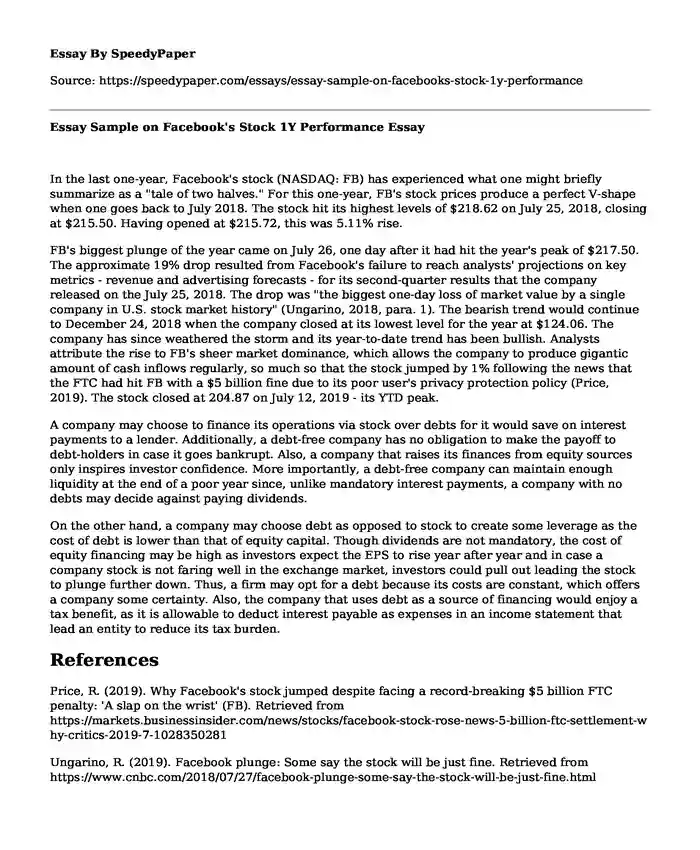
| Type of paper: | Essay |
| Categories: | Facebook Audit Financial analysis |
| Pages: | 2 |
| Wordcount: | 492 words |
In the last one-year, Facebook's stock (NASDAQ: FB) has experienced what one might briefly summarize as a "tale of two halves." For this one-year, FB's stock prices produce a perfect V-shape when one goes back to July 2018. The stock hit its highest levels of $218.62 on July 25, 2018, closing at $215.50. Having opened at $215.72, this was 5.11% rise.
FB's biggest plunge of the year came on July 26, one day after it had hit the year's peak of $217.50. The approximate 19% drop resulted from Facebook's failure to reach analysts' projections on key metrics - revenue and advertising forecasts - for its second-quarter results that the company released on the July 25, 2018. The drop was "the biggest one-day loss of market value by a single company in U.S. stock market history" (Ungarino, 2018, para. 1). The bearish trend would continue to December 24, 2018 when the company closed at its lowest level for the year at $124.06. The company has since weathered the storm and its year-to-date trend has been bullish. Analysts attribute the rise to FB's sheer market dominance, which allows the company to produce gigantic amount of cash inflows regularly, so much so that the stock jumped by 1% following the news that the FTC had hit FB with a $5 billion fine due to its poor user's privacy protection policy (Price, 2019). The stock closed at 204.87 on July 12, 2019 - its YTD peak.
A company may choose to finance its operations via stock over debts for it would save on interest payments to a lender. Additionally, a debt-free company has no obligation to make the payoff to debt-holders in case it goes bankrupt. Also, a company that raises its finances from equity sources only inspires investor confidence. More importantly, a debt-free company can maintain enough liquidity at the end of a poor year since, unlike mandatory interest payments, a company with no debts may decide against paying dividends.
On the other hand, a company may choose debt as opposed to stock to create some leverage as the cost of debt is lower than that of equity capital. Though dividends are not mandatory, the cost of equity financing may be high as investors expect the EPS to rise year after year and in case a company stock is not faring well in the exchange market, investors could pull out leading the stock to plunge further down. Thus, a firm may opt for a debt because its costs are constant, which offers a company some certainty. Also, the company that uses debt as a source of financing would enjoy a tax benefit, as it is allowable to deduct interest payable as expenses in an income statement that lead an entity to reduce its tax burden.
References
Price, R. (2019). Why Facebook's stock jumped despite facing a record-breaking $5 billion FTC penalty: 'A slap on the wrist' (FB). Retrieved from https://markets.businessinsider.com/news/stocks/facebook-stock-rose-news-5-billion-ftc-settlement-why-critics-2019-7-1028350281
Ungarino, R. (2019). Facebook plunge: Some say the stock will be just fine. Retrieved from https://www.cnbc.com/2018/07/27/facebook-plunge-some-say-the-stock-will-be-just-fine.html
Cite this page
Essay Sample on Facebook's Stock 1Y Performance . (2023, Jan 28). Retrieved from https://speedypaper.com/essays/essay-sample-on-facebooks-stock-1y-performance
Request Removal
If you are the original author of this essay and no longer wish to have it published on the SpeedyPaper website, please click below to request its removal:
- Free Essay on The Sparrow Book
- Peacemaking Reflection Assignment, Free Essay Sample
- Essay Sample: Bank of America Versus Sundquist
- Essay Sample on Apple Solutions
- Essay Sample on Comparative Statistics on The Health Systems
- Paper Example. Modification and Accommodation for Learners With Inabilities
- Paper Example: Analyzing IBM Stock Prices: ACF, PACF, and the Quest for Stationarity
Popular categories




